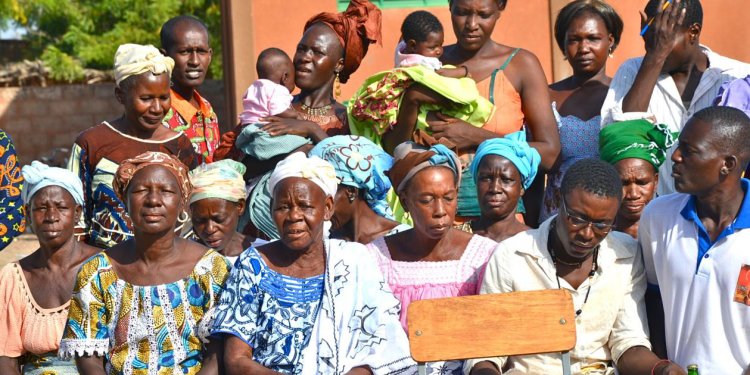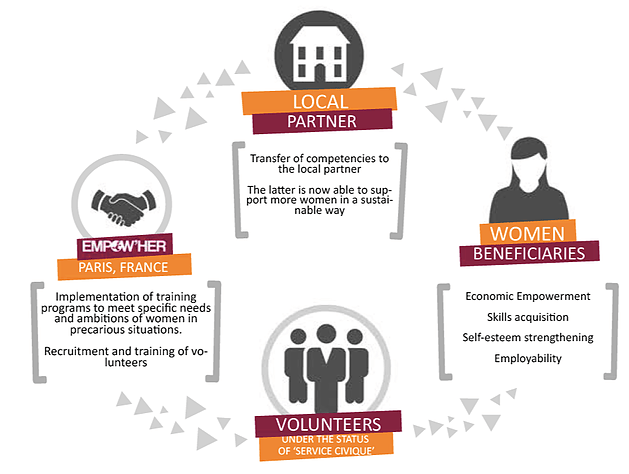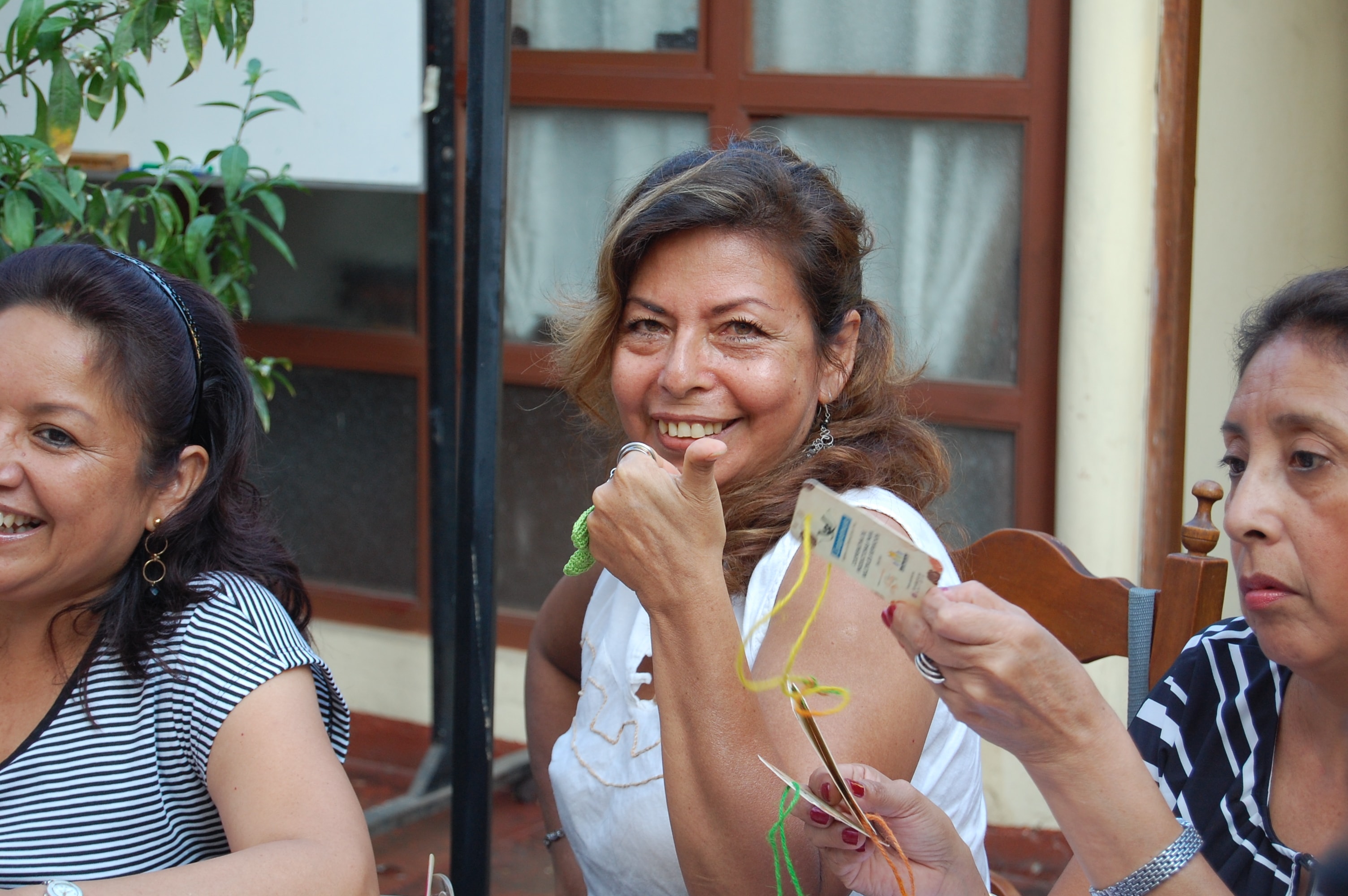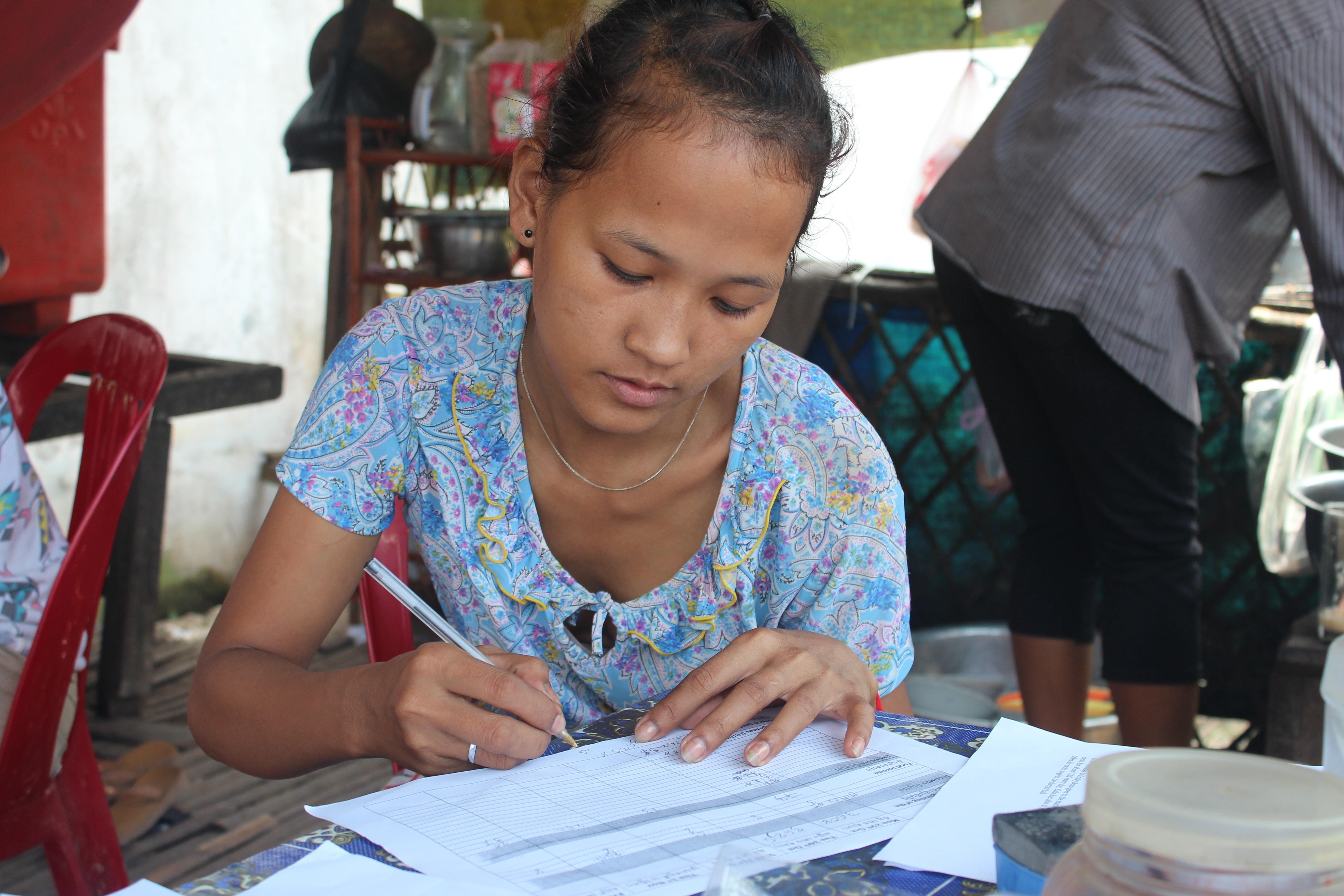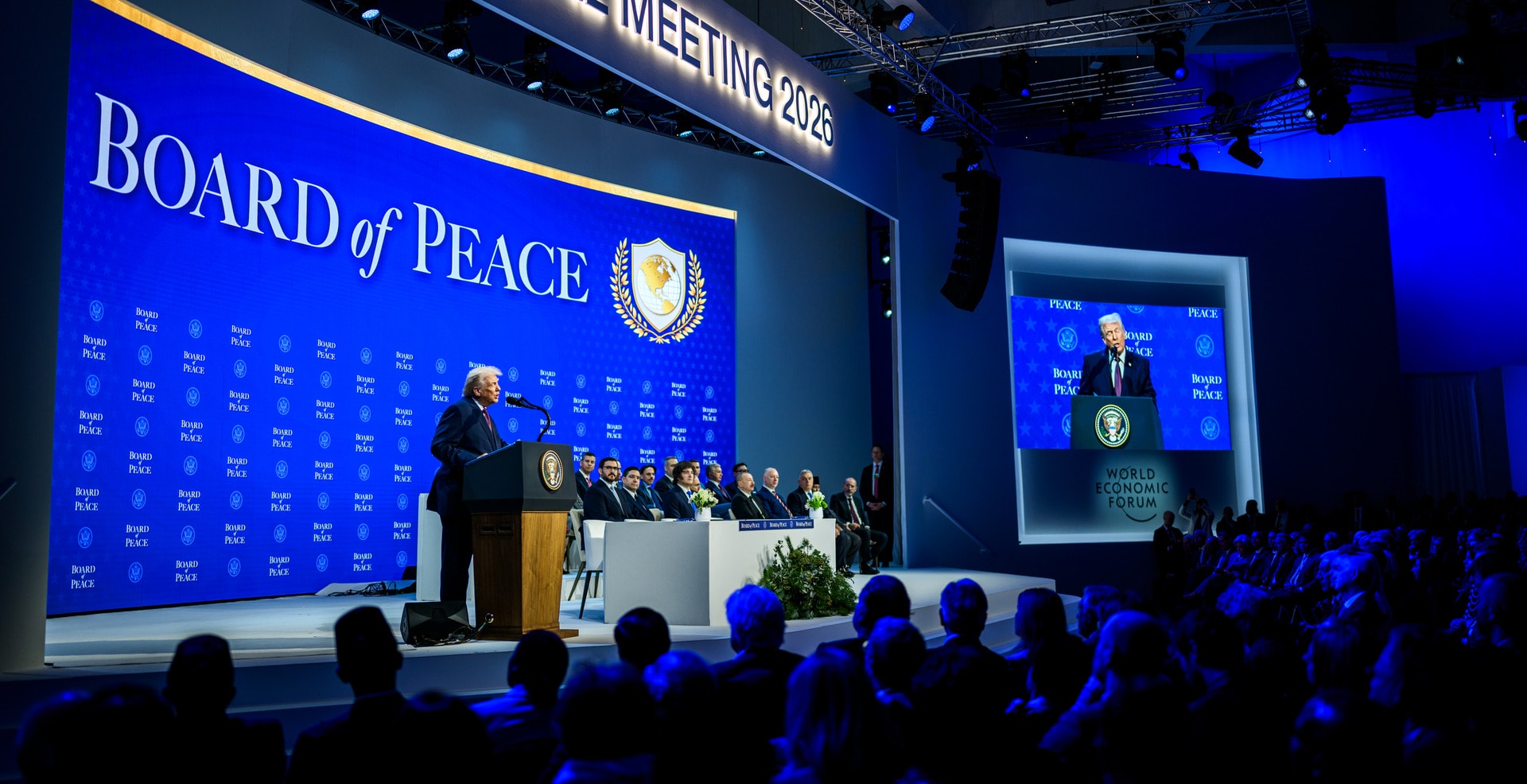Empowering Women through Entrepreneurship
 Empow’her was founded in 2013 and became an NGO in September 2015 when Soazig Barthélemy, Founder and Executive Director of Empow’her, took a leap of faith and decided to dedicate her life to turning a student project turned volunteer association to a professional NGO. Now present in 6 countries (Peru, Burkina Faso, Morocco, Tunisia, Myanmar and Thailand), with 7 programs of training and mentoring of over 300 women, Empow’her is a team of 14 full-time employees, of which 9 are now in the field abroad along with over 30 volunteers. Now undergoing the final days of their crowdfunding campaign running from the 6th to the 26th of July, they have reached over 90% of their objective.
Empow’her was founded in 2013 and became an NGO in September 2015 when Soazig Barthélemy, Founder and Executive Director of Empow’her, took a leap of faith and decided to dedicate her life to turning a student project turned volunteer association to a professional NGO. Now present in 6 countries (Peru, Burkina Faso, Morocco, Tunisia, Myanmar and Thailand), with 7 programs of training and mentoring of over 300 women, Empow’her is a team of 14 full-time employees, of which 9 are now in the field abroad along with over 30 volunteers. Now undergoing the final days of their crowdfunding campaign running from the 6th to the 26th of July, they have reached over 90% of their objective.
How did you get the idea to found Empow’her?
Soazig Barthélemy: I studied at a Parisian Business School, ESCP. During my studies, I was very drawn to the question of women’s rights and the situation of women internationally and had opportunities to tackle those issues, but I wanted to see what was being done in the field particularly concerning women in entrepreneurship. It was a subject on which I had a lot of theoretical knowledge but no practical, hands-on experience. At ESCP and ESSEC, we put together a team for a six-month humanitarian mission in different countries (Cambodia, Burkina Faso, Senegal, and Peru). Our objective was to monitor the success or failure for women entrepreneurs in these countries. We worked with women in different entrepreneurial situations, most of whom had only access to small tools, micro-finance and were in a precarious situation.
Many women are entrepreneurs and don’t realize it, they don’t qualify themselves entrepreneurs.
These are women that don’t call themselves entrepreneurs because they didn’t choose this path. They became entrepreneurs because they had to, undergoing pressure to sustain their family. Whereas in school, we were taught to see entrepreneurship as a calling, these experiences introduced us to entrepreneurship as a necessity – survival entrepreneurship if you will.
No one is born an entrepreneur and being an entrepreneur requires skills. In these countries, there is a strong entrepreneurial culture but a lack of entrepreneurial skills. A large majority of women with whom we were working didn’t manage to keep their business afloat or didn’t necessarily get personal, social or economic gain out of it. We thought there was a solution to empower these women towards emancipation through entrepreneurship.
An untapped potential – because entrepreneurship is seen as a survival tool rather than a tool towards personal growth and community development.
Both student groups on those six-month missions came to the same realization: no training and mentoring system existed to teach entrepreneurship to women. The activities in which they were involved weren’t wealth- and job-creating. After these pilot missions in 2012, we decided to team up and create first the association in 2013, and now the NGO Empow’her.
Photo Credit: Soazig Barthélemy/Empow’Her
What is Empow’her’s goal?
S.B.: Our challenge is to transform entrepreneurship as a vector for sustainable development, an asset to strengthen these women. What is incredible and different in developing countries is that women entrepreneurs already exist – there are more women entrepreneurs than men… So, you don’t need to go and convince them to start their own business. Entrepreneurship brings forth a potential for personal growth, freedom, independence, and self-expression in an economic context.
A promise of economic and social emancipation
As we came back from our pilot missions, we wanted to make sure we would deliver solutions, raise awareness and bring our promise to life. And so we did, we created the NGO. Up until last year, we were a volunteer structure. For three years, we put training systems into place for women entrepreneurs (structures pre-existing in the countries that already identify women who may need coaching) in six countries: Myanmar, Thailand, Tunisia, Morocco, Burkina Faso and Peru.
Photo Credit: Soazig Barthélemy/Empow’Her
Currently, we are creating two Empow’her hubs, one in Morocco the other one in Ivory Coast. These hubs will have incubators as well as a training facility. A local Empow’her structure dedicated to women entrepreneurship while keeping the idea of empowerment and involvement of local entities at our core.
At the end of the day, our objective is to have a network of hubs throughout developing countries, training centers, structures that can offer solutions to the three key elements of entrepreneurship: Skill Improvement, Leadership, and Networking. We are intervening in all aspects of entrepreneurship but financing because micro-finance solutions already exist.
Related article: “AN EMPOWERING PATH”
Women entrepreneurship is very diverse. It goes all over from a very informal one, a woman that is in a very precarious situation to a woman with great potential that has an innovative business idea and could very well be the next success story in her country. Our idea is to offer solutions that are very diverse around these three aspects to reinforce women entrepreneurship and consolidate it as a movement.
Photo Credit: Soazig Barthélemy/Empow’Her
What makes Empow’her different from other organizations tackling entrepreneurship in developing countries?
S.B.: There are other structures working similarly to the first version of Empow’her (without the hubs project). These structures manage to help roughly 30 to 150 women. They have a significant, qualitative yet limited impact. Our ambition is to be a structure devoted to women and supporting entrepreneurship, globally. As of now, we have managed to help over 400 women!
What is the structure of a volunteer mission today (civic service)?
S.B.: The missions are conducted over one to two years and there are three steps to them. We recruit people from the European Union for volunteer missions in civic service. The first step is the diagnostic phase. This is crucial for us as it is out of the question to apply a methodology that doesn’t fit and isn’t applicable to real needs. In this step, we ask women for their permission to work with them and … it takes us about 2 months to diagnose what the enterprise is, what are the problems that they are facing, and what the end goals are. We come back with action plans on what needs to be done to get there: this step focuses on problems to address along with their solutions. The second step is training and implementation of solutions. This takes the most time. And finally, an evaluation process to see what has been created, what the results are, the impact of our action.
Photo Credit: Soazig Barthélemy/Empow’Her
Would you qualify Empow’her as feminist?
S.B.: Well, no – as far as I’m concerned this is rather of an individual statement and Empow’her is not a feminist movement, on the contrary. We are an NGO that aims to unlatch economic potential for women. Yes, our goal is to empower women but not necessarily to serve a feminist purpose. We want to counterbalance existing inequalities and give these women the tools to become the best entrepreneur they can be. We are definitely for gender equality and all team members are in favor of development of actions to raise awareness towards gender equality. We do have a feminist vision, for sure, but it depends on what you mean by feminism, and that could be a whole other debate. It’s a word we avoid, we just don’t identify feminism with our organization per se, but our ambition is to help women, come out of the casualization of women entrepreneurship and go from a survival to chosen entrepreneurship.
For a full mindmap behind this article with articles, videos, and documents see #women
There is a characterization of women in entrepreneurship. For instance, women tend to be much more in tune with the production side rather than transformation side of the chain, doing the upstream work. We would like to give them the tools and solutions they need to use entrepreneurship as a vector for personal development. It is right in line with the UN Sustainable Development Goals, SDG8, to create decent work, as well as SDG5, promoting gender equality.
What is a common problem you help solve and encounter often?
S.B.: Typically, they don’t actually know when they are losing money. They don’t know how to calculate their costs. The most common I’d say is that they forget to integrate fixed costs and just count the variable costs. So they are producing at a loss! Of course, there are other elements that may threaten their enterprise, but business management is often what they lack of.
Will you share with us an anecdote about a woman you have come across and that marked you?
 S.B.: It’s a personal anecdote that dates back to 2012. I was part of the Cambodia mission and once there we were helping around 15 women, selected by our local partner at the time. We were living in a small rural area, in the middle of nowhere, and we had a neighbor. A sweet lady with three kids and a husband, who wasn’t doing much of his time to be truthful; she was illiterate, would spend her day in her one-room house – the room in which all five of them lived – stitching, mending, sewing clothes for the factory along the road, clothes that we’re probably buying here in France… Miserable life but such an adorable lady. We didn’t speak a word of Cambodian but our interpreter explained to us that she wanted to get in the program. She was not part at all of the beneficiaries, since they all had had access to micro-credit finance from one of our local partners. We still went ahead and got her into our program. She was just incredible. Her learning ability was impressive… we only stayed four months there, and she entered the program late, two months after everyone else. But let me tell you this, it is all she needed: in a month she had started her own business, a small grocery shop – she had understood everything. In a month, she managed to pay for her oldest’s son, five years old, to go to elementary school. One night we came back home, and they were having meat for dinner… they never had enough money to eat meat! It’s just those little things that make it worthwhile. I cannot see those little things for the hundreds of women that we are helping, but this one was my neighbor, so I can’t help but recall this memory when I talk about what I do here.
S.B.: It’s a personal anecdote that dates back to 2012. I was part of the Cambodia mission and once there we were helping around 15 women, selected by our local partner at the time. We were living in a small rural area, in the middle of nowhere, and we had a neighbor. A sweet lady with three kids and a husband, who wasn’t doing much of his time to be truthful; she was illiterate, would spend her day in her one-room house – the room in which all five of them lived – stitching, mending, sewing clothes for the factory along the road, clothes that we’re probably buying here in France… Miserable life but such an adorable lady. We didn’t speak a word of Cambodian but our interpreter explained to us that she wanted to get in the program. She was not part at all of the beneficiaries, since they all had had access to micro-credit finance from one of our local partners. We still went ahead and got her into our program. She was just incredible. Her learning ability was impressive… we only stayed four months there, and she entered the program late, two months after everyone else. But let me tell you this, it is all she needed: in a month she had started her own business, a small grocery shop – she had understood everything. In a month, she managed to pay for her oldest’s son, five years old, to go to elementary school. One night we came back home, and they were having meat for dinner… they never had enough money to eat meat! It’s just those little things that make it worthwhile. I cannot see those little things for the hundreds of women that we are helping, but this one was my neighbor, so I can’t help but recall this memory when I talk about what I do here.
Photo Credit (above): Soazig Barthélemy/Empow’Her
How are you funded right now?
S.B.: Today, we get external subventions and there is an ongoing crowdfunding campaign going on until the 26th of June actually! For the Empow’her hubs, our ambition is to create entities that are economically viable. So Empow’her is shifting from an NGO model, dependent from bigger institutions, to a social entrepreneurship model. So we are both switching up our mode of action as well as our business model.
Photo Credit: Soazig Barthélemy/Empow’Her
What are the long-term objectives for Empow’her?
S.B.: By 2017, we want our hubs to be opened in Morocco and Ivory Coast. Our challenge is to make this hub model replicable to multiply it across our targeted countries. Of course, we will take into account the reality of women entrepreneurship and issues specific to each country but we would like to build a network of Empow’her hubs and solutions that can be applicable to a majority of women entrepreneurs. The goal of our first missions in 2012 was to find common grounds in women entrepreneurship within four countries that were fundamentally different. These experiences revealed that there are enough similarities for this project to be viable and scalable – women face similar problems in their enterprises. Our ambition isn’t necessarily to become a large global institution, but we do have great ambition which is to build a strong and large network of Empow’her hubs throughout the world to serve women entrepreneurship and provide solutions to emancipate them economically and socially.
We want to develop a real solution for them. Thinking globally, acting locally.
What advice would you give to women entrepreneurs, like yourself?
S.B.: There’s a quote I love in Sheryl Sandberg’s Lean In, she keeps repeating this question over and over again.
What would you do if you weren’t afraid?
Generally, as women, we are not born or raised as adventurers or entrepreneurs. Social expectations want us somewhere else other than where men are, perhaps. So I believe that we tend to hold back, create internal barriers and reinforce external and social barriers. For an entrepreneur, a lot of things happen within ourselves – auto-censorship, fear of failure, perfectionism. To be an entrepreneur, you have to accept failure, you need to hang on; and yes there are a lot of things to fight for and against to become a successful entrepreneur. It’s not about an opposition between men and women – that is not even a debate – we are just facing the fact that there are more men than women entrepreneurs, in France for instance. And we need to find solutions.
Start by doing one thing a day that scares you.
 You may not be predestined to become an entrepreneur, but it does not mean that within you doesn’t lie the potential and the will to become an entrepreneur. And from there, learn the skills, find the tools and most importantly, surround yourself – because you can’t do it alone.
You may not be predestined to become an entrepreneur, but it does not mean that within you doesn’t lie the potential and the will to become an entrepreneur. And from there, learn the skills, find the tools and most importantly, surround yourself – because you can’t do it alone.
For more on Empow’her visit their website and to help them empower more and more women, take a look at their crowdfunding campaign.
Recommended reading: “FEARLESSNESS, COURAGE, AND CAPITAL: WHAT’S NEEDED TO FEUL THE NEXT STAGE OF GROWTH FOR WOMEN ENTREPRENEURS”
_ _
FEATURED PHOTO CREDIT: Soazig Barthélemy
EDITOR’S NOTE: THE OPINIONS EXPRESSED HERE BY IMPAKTER.COM COLUMNISTS ARE THEIR OWN, NOT THOSE OF IMPAKTER.COM.
Empow’Her Women Instagram.com


